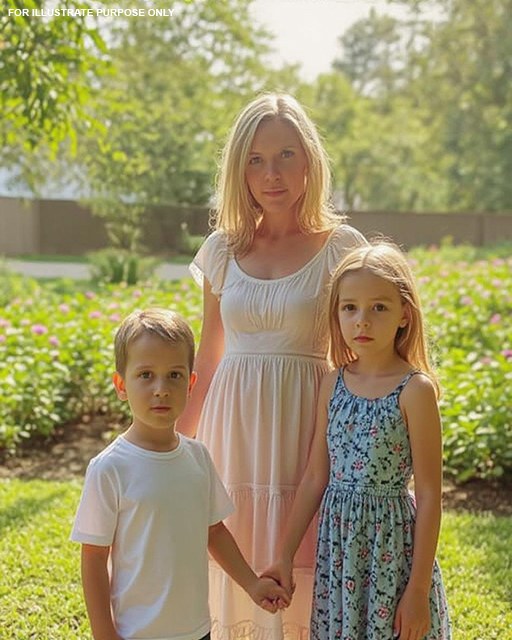Rain fell in heavy sheets, battering the aging roof of the tiny house at the end of Oakridge Lane. Inside, 34-year-old single mother Maria Thompson stood in the dim light of the kitchen, holding a pot under a steady leak that had broken through the ceiling again. Her two children, Ava (7) and Jacob (4), huddled on the couch with a blanket wrapped around their shoulders. The sound of thunder made Jacob whimper and cover his ears.
It had been this way for weeks. Ever since the last major storm, the roof had begun to rot and buckle. The leaks had multiplied. Pails, pots, and bowls decorated the floors like odd furniture. The constant dripping was like a cruel ticking clock — a reminder of everything Maria couldn’t fix.
Maria had no family to call. Her husband, a construction worker, had died three years earlier in a worksite accident, leaving her to raise the kids alone. Since then, every dollar she earned at the diner went to groceries, rent, and the bare minimum for daycare. Repairs, she told herself repeatedly, were a luxury she couldn’t afford.
The house had been all she could afford after her husband’s passing. It had good bones, the landlord had said, but the bones were clearly crumbling now. And with her landlord out of state and ignoring her calls, Maria was left to carry the burden alone.
She slumped against the wall and wept quietly, trying not to let her kids hear. But Ava did. The little girl padded over in her unicorn slippers, placed a hand on her mother’s shoulder, and whispered, “Don’t cry, Mama. I asked God to help us. Maybe He’s listening.”
Maria didn’t have the heart to say what she was thinking: God is busy. But she nodded and held her daughter close.
What Maria didn’t know was that someone had been listening — or at least watching.
Next door, through the slatted blinds, elderly couple Ed and Lorraine McKinley had seen the blue tarps and buckets. They had seen Maria rushing the kids into the car under umbrellas. And Ed, a retired contractor with arthritis in his hands but still a heart full of purpose, had finally had enough.
The next morning, Ed showed up on Maria’s porch with his toolbelt slung around his waist like an old badge of honor.
“Morning,” he said, tipping his cap. “Hope you don’t mind, but I noticed you’ve been having some trouble with the roof.”
Maria opened the door cautiously. She looked tired, hair tied up, dark circles under her eyes. “Yeah. It’s… it’s pretty bad.”
Ed nodded. “Mind if I take a look?”
She hesitated. “I can’t really afford anything right now…”
Ed waved a hand. “Didn’t ask for payment. Just wanna see.”
From there, a spark turned into a blaze.
Ed climbed the roof that day — slow but steady. He brought photos down. “Rotten shingles, busted flashing, and a whole lotta water damage,” he explained.
That night, the McKinleys made some calls. They told the neighbors on Oakridge what was going on — and something remarkable happened.
By the end of the week, the entire neighborhood had rallied.
Ava squealed when she saw trucks and ladders pulling up in front of the house. Volunteers brought wood, nails, tools. A younger couple from three doors down, Marcus and Leila, brought hot meals every evening. Mrs. Jensen, the schoolteacher, offered to watch the kids during the repairs.
One neighbor, Jamal, worked in roofing. Another, DeShawn, had scaffolding from his painting business. “We’ve got this,” Jamal told Maria. “You’ve been through enough.”
Maria stood on the porch with a hand over her mouth, tears slipping silently down her face. “Why would you all do this for me?”
Lorraine stepped forward and wrapped her in a hug. “Because you’re our neighbor. Because no mother should have to choose between feeding her kids and staying dry at night.”
The project took six days.
They tore off the broken roof and replaced every rotted board. They sealed the attic, laid new insulation, and installed fresh shingles. On the final day, the sun came out for the first time in weeks.
When Ed hammered in the final nail, the entire street burst into cheers. Maria brought out lemonade, and the kids handed out hand-drawn “Thank You” cards.
Later that evening, as the golden sun cast a warm glow over the freshly repaired house, Maria stood in the doorway and looked out. She saw the neighbors chatting, laughing, tools slung over their shoulders.
Ava tugged at her sleeve. “Mama, God heard me.”
Maria smiled through tears, kissed her daughter’s forehead, and whispered, “Yes, baby. He heard you. And He sent an army of angels in work boots.”
The roof didn’t just stop the rain — it restored Maria’s faith in people.
Word of the story spread. A local news station covered it. Donations came in. The landlord, under pressure, offered Maria ownership of the home for a steep discount. The neighborhood formed a “Good Neighbor Group” — organizing monthly support for anyone in need.
But most importantly, that little house on Oakridge Lane became something else.
It became a symbol.
Of kindness without cost. Of neighbors who didn’t wait for permission to care. Of how love — real, rolled-up-sleeves love — can change lives.
And on every rainy night that followed, as the storm pounded outside and her children slept warm and safe, Maria no longer heard the drips or the despair.
She only heard the memory of hammers, laughter, and hope.
And it was the most beautiful sound in the world.

